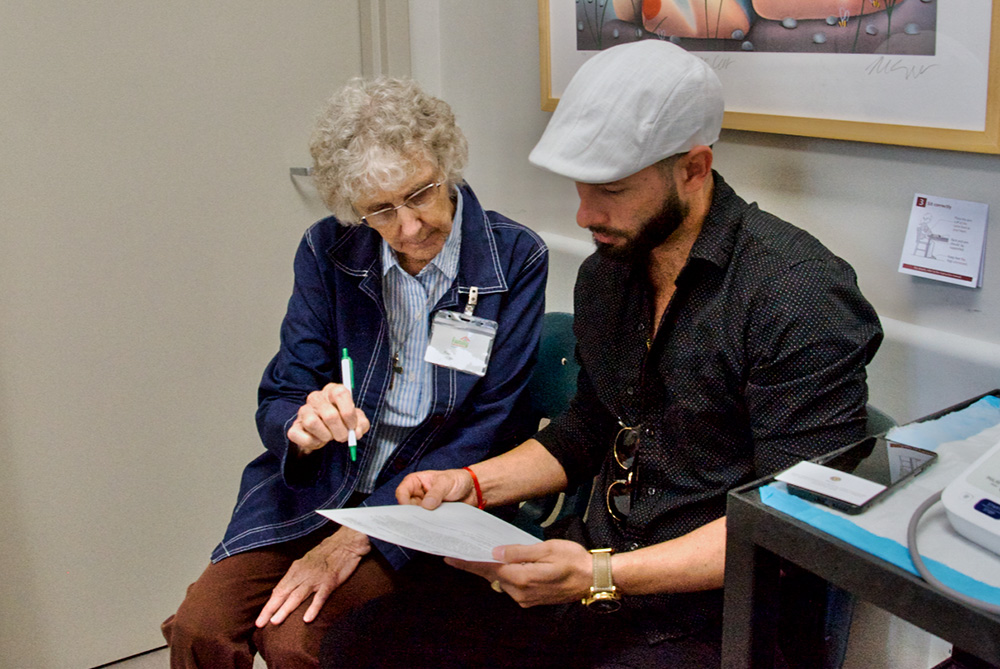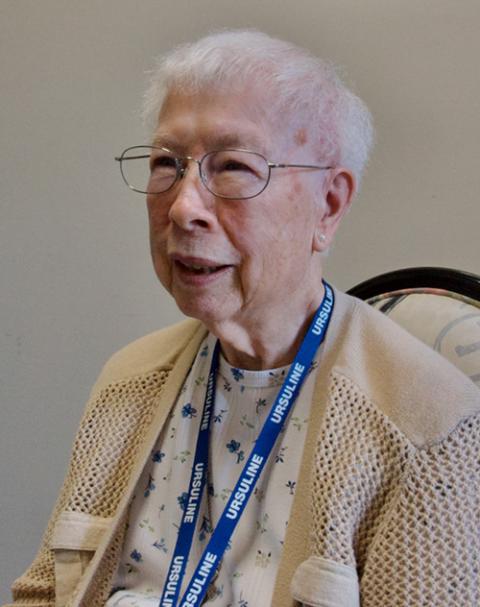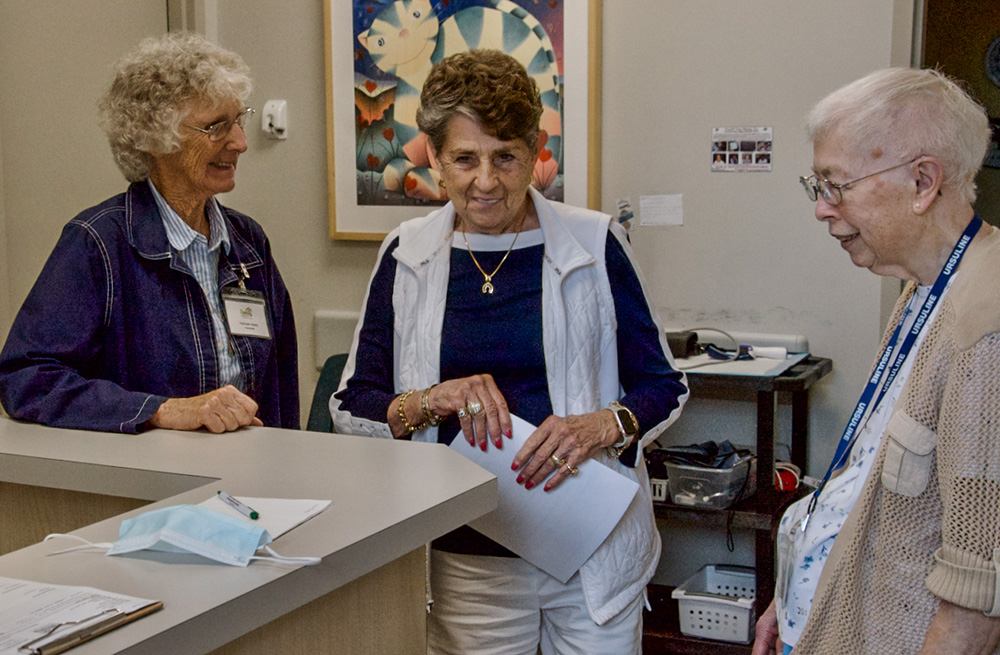
Sr. Kathleen Neely speaks in Spanish to a patient at the Family Community Clinic in Louisville, Kentucky, where she volunteers as a translator. (GSR photo/Dan Stockman)
The woman sits nervously in the exam room chair as she waits for the doctor or nurse to come in and ask her questions.
But she relaxes as soon as Sr. Kathleen Neely enters the room and speaks to her in Spanish, explaining that she will translate for her when the nurse arrives shortly.
It's a routine that happens over and over at the Family Community Clinic, a free medical clinic on the St. Joseph Parish campus just east of downtown Louisville, Kentucky: Patients come in and Neely or Sr. Mary Martha Staarman, both Louisville Ursuline sisters, become a bridge between the providers' English and the patients' Spanish.
"Sometimes they tell me things they won't tell the doctors," Staarman said, "especially the women."

Sr. Kathleen Neely speaks about the 45 years she spent ministering in Peru. She now volunteers as a translator at the Family Community Clinic in Louisville, Kentucky. (GSR photo/Dan Stockman)
Staarman, known as "Cool Martha" around the clinic, has earned her rapport with Spanish-speaking women. After spending 15 years ministering in Peru, she spent 32 years ministering to pregnant women in West Chester, Pennsylvania, accompanying them to every doctor visit, ultrasound appointment and the hospital for delivery.
"I have over 200 'grandchildren,' " Staarman said. "There's a group of them that still keep in touch."
But she didn't always speak Spanish. She volunteered on a whim to answer Pope John XXIII's call for missionaries to Latin America, and was shocked when she was chosen.
"I spoke absolutely no Spanish," Staarman said. "Zip. None."
She helped the other Ursuline sisters in Peru set up a school, and in the process found she was exactly where she needed to be.
"I think I found my vocation among the people there," she told the congregation's magazine in 2016. "It made me see religious life in a different context."
By contrast, Neely — known around the clinic as "Fantastic Kathy" — developed a love for the Spanish language in high schoo. But, like Staarman, Neely was surprised in 1968 when she was among the sisters chosen to minister in Peru, where she started and taught in schools and spent decades in pastoral ministry in the mountains. In total, she spent 45 years in Peru.
Today, the two volunteer at the clinic a couple of days a week each, but on different days to ensure a translator is always available.
"We're like two ships in the night," Neely said. "We never see each other."
Advertisement
The clinic began in 2011 thanks to the efforts of parishioners and a priest and operates entirely on donations and grants. It exists to serve those without health insurance.
"All of our providers are volunteers," with a dermatologist working there once a month and dentists twice a month, said executive director Ellen Wells.
"Many of our patients haven't seen a provider in years," Wells said. "Many work two or three jobs, but their employers don't offer or they don't qualify for insurance."
The translators are critical, she said, because the providers cannot give proper care unless they understand the patients. They see about 300 patients a month, most of whom speak only Spanish.
In addition to Staarman and Neely, the clinic has a relationship with the University of Louisville medical school and its medical interpreter program that lets students get experience at the clinic. The clinic can also refer patients to the medical school for specialized care when needed.
After Staarman returned to Louisville from Philadelphia in 2018, she wanted to keep her Spanish skills in shape and enrolled in the medical interpreter program; when they wanted her to work full time but Staarman didn't want that many hours, they referred her to the clinic, where she has been volunteering ever since.

From left: Sr. Kathleen Neely, executive director Ellen Wells, and Sr. Martha Staarman speak at the Family Community Clinic in Louisville, Kentucky, where the sisters volunteer as translators. (GSR photo/Dan Stockman)
Medical interpreter courses are critical, officials said, because even the best Spanish speakers may not be able to translate medical terms such as "contraindicated." Many of the patients also may not be familiar with how things are done, such as getting prescription refills.
It's a situation Staarman is intimately familiar with: She contracted hepatitis while in Peru.
"The doctors and nurses — I had no idea what they were saying," she said. "I didn't even know what I had."
When Neely returned from Peru in March 2020, just before the COVID-19 pandemic began, Staarman recommended she join her in volunteering at the clinic.
"I said I don't think I can do it, but she said I should try," Neely said. "The first day I just sat in the parking lot and said, 'This is ridiculous, I can't do this.' But when I came in and saw how the clinic worked as a team — the atmosphere is just like family."
It's also nice to see how much the clinic is needed and how thankful the patients are, Neely said.
"The patients are so appreciative, they're very grateful," she said. "And the providers will take all the time in the world with each patient if that's needed, and they really appreciate that."







